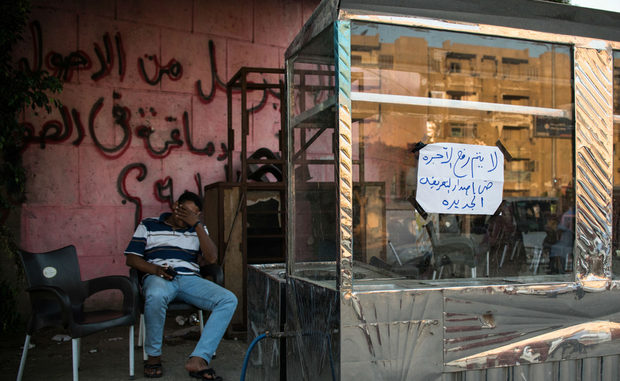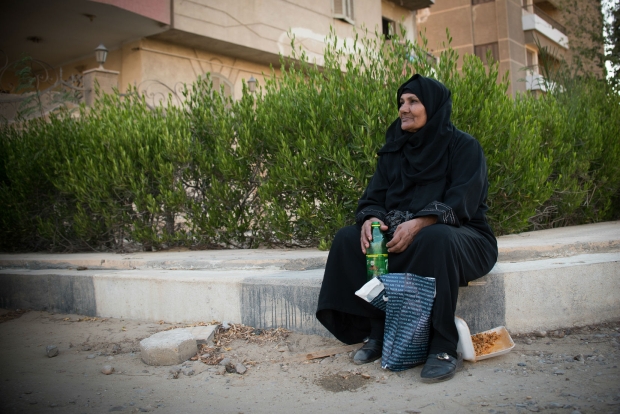
Terms of new IMF loan dictate that fuel subsidies have to be scrapped, meaning costs are increasing yet again
As the microbus zooms around Cairo, its passengers are unhappy – as the cost of fuel has increased by 50 percent, public transport fares have also risen.
A trip which used to cost four pounds, or four-and-a-half at most, now costs five ($0.27).
“Why are you complaining to us?” the driver asks. “Go complain to the people who are raising the prices.”
“The door to the prison cell is open,” another passenger answers rhetorically, implying that any such complaint would land the complainer in prison.
Under the terms of its $12bn International Monetary Fund loan, the first batch of which Egypt received in November 2016, the cost of fuel has doubled in price, a move that has been roundly met with anger and a sense of devastation by the people of Egypt.
Gasoline prices have increased to 3.65 EGP ($0.20) per litre, a rise that Egyptians expect to soon see rippling across to other goods and services.
The IMF is expected to give Egypt the money across a three-year timeframe.

For Nazek Mohamed, a woman in her 60s who lives with her single daughter, the news is stressful and causes her further grief.
She is already struggling to get by on the meagre pension of her late husband and a few days of cleaning work a month.
“Again?” she said. “What are we supposed to do?”
“A kilo of beef now costs 140 pounds [$7.70]. I have never seen anything like this. I can’t even dream about meat now,” she told Middle East Eye.
I have never seen anything like this, I can’t even dream about meat now
– Nazek Mohamed, widow
Mohamed’s late husband’s pension is about $17.90 a month.
Sometimes, she said, she tries to boost her income by selling soda and crisps on the street in a neighbourhood, where everyone knows her as Umm Hany.
“I can’t move or work as much anymore. Going up steps, or even taking a step to get up into a microbus hurts me,” she said. “It must be because I’m malnourished.”
Timing destructive
Shrief El-Khoraiby, an economics expert and member of the Egyptian Council for Foreign Affairs, told MEE that “the conclusion is that the government doesn’t think about its citizens at all. The timing of this move is very bad.”
“Loans are a tool,” Khoraiby said. “We can use them, but when we can actually repay them. Otherwise, loans become the best way to destroy a country.”
Even the more privileged classes of society have their concerns.
Adel Samika, a young man who considers himself a part of the middle class, or even the upper middle class, earns about $386 a month from his work in advertising.
“It’s not sufficient anymore,” he said.
For Samika, “the ruling regime is destructive on all levels,” and this “sequence of blows is making people dazed. [The government] is constantly testing people’s limits.”
Norma Zin, a middle-class school teacher and mother, said that no one has the energy, any longer, to oppose the government’s decisions when any sign of dissent is expected to be met with force.
Read more ►
‘Go hungry’: Egypt general tells million to stop complaining
She supported the current Abdel Fattah al-Sisi government early on, but now feels that she and others have reached their limits.
“The idea is that everyone opposes these policies, but no one is going to be able to say or do anything,” she told MEE.
“We’ve already had to give up on anything remotely luxurious in the past. We stopped going out, we stopped buying certain things, now we’ll have to park our cars and start taking public transport.”
For their part, government officials reiterate that the increases are aligned with the IMF plan of economic reform.
“Without these decisions the cost of fuel subsidies approaches 150bn pounds [$8.2bn], a cost the state cannot bear,” Prime Minster Sheirf Ismail said during a news conference immediately after the fuel price decision was announced, Ahram Online reports.
“Most of the time there has been no justice in the distribution of subsidies. What we are doing now is correcting the allocation of subsidies as part of the country’s economic reform programme,” he said.
Khoraiby said that mistrust of the government is widespread. “People aren’t ready to hear any more bad news, and their reactions are unpredictable.
“The people don’t understand what is happening, there is no transparency, and there are conflicting statements from ministers.
“We need documents, we need to know how the government is spending its funds, and we need to see accurate figures.”
On social media, jokes are spreading about people going to sleep “as part of the middle class” and waking up to find themselves part of the “low-income stratum of society”.
Translation: One falls asleep as a middle-class (individual) and wakes up to find himself among the low-incomers.
As Samika reads it, the “neoliberal policies being implemented on the country and the region depend on the middle class being permanently pressured and constantly struggling not to fall into the pits of poverty”.
Ismail, the prime minister, also announced on Thursday that the price of electricity will increase from August, another move towards the five-year plan to gradually and ultimately fully remove fuel subsides from the state’s budget altogether.
For now, ministers have stated that they will be keeping an eye on the market. Transportation officials have added that the official increase in transport fares will range between 10 to 20 percent.
On Thursday and Friday, drivers awaited the final announcement about the expected price hike.
Dissent unlikely
Hassan, a microbus driver who did not want to give his real name for fear of repercussions, was waiting. “We’ll have to wait until Sisi decides.
“I would kiss the ground that Hosni Mubarak walked on now that I see how things are with Sisi,” he said, referring to the former president who resiqned amid protests in 2011.
“With Mubarak, a litre of gasoline was 80 piastres and now it is 3.65 EGP. People are literally working just to be able to pay for their trips to work,” he said.
A younger driver, Hamdy Se’eedy, told MEE that the increases in fares, which have happened repeatedly over the past year, usually come at a loss for the drivers.
“If you don’t own your car and have to pay commission or rent to its owner, then you might as well quit because it’s not worth it anymore.”
A few reports of small protests spread on Thursday. Yet many are sceptical that more dissent is imminent.
“It’s all happening one thing after the other. They’re not giving people a chance to take a breath,” Hassan said. He cited rumours that a rickshaw driver who spoke up about the economic hardships last year went missing afterwards.
“I don’t want to go to jail,’ he said. “There’s no future here [in this country] except devastation.”
